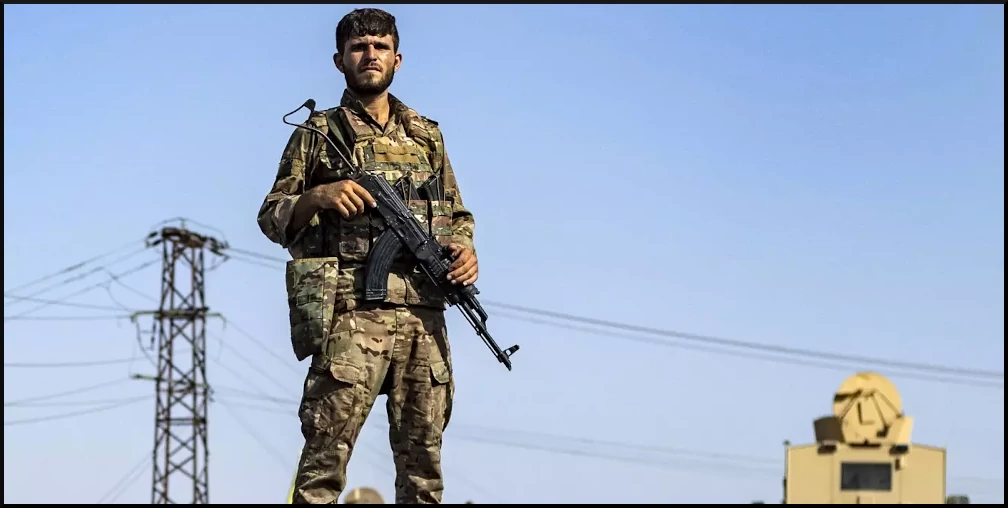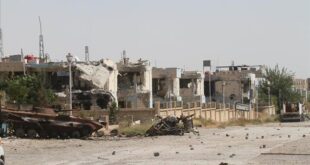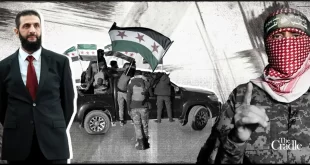by Vladimir Van Wilgenburg, published on Middle East Eye, September 5, 2023
This article from a couple of weeks ago is the most informative I have seen regarding the stakes of the various players involved. Be careful to note who is speaking when you read the various testimonies. [jb]
Days of fighting between the US-backed Syrian Democratic Forces (SDF) and members of local Arab tribes in Deir Ezzor, in eastern Syria, has highlighted local discontent with the control of the Kurdish-led group over a predominantly Arab population.
Clashes erupted on 27 August after the SDF detained Ahmad al-Khubail, a senior Arab SDF commander and head of the Deir Ezzor military council known as Abu Khawla, on accusations of complicity in drug trafficking and failing to tackle activities of the Islamic State militant group, among other crimes.
The arrest has led to widespread unrest that saw tribal fighters take SDF fighters hostage – seizing several checkpoints, ambushing vehicles and shelling SDF positions in several towns and villages.
Meanwhile, the SDF has sent reinforcements to these areas as it sought to quell the unrest.
The violence – taking place in towns and villages at the heart of Arab tribal territory in Kurdish-controlled areas of Deir Ezzor province – has killed 90 people, including nine civilians, according to the Syrian Observatory for Human Rights.
The SDF was forced to withdraw from large parts of eastern Deir Ezzor, and they launched “Operation Security Reinforcement”.
Siyamend Ali, a press officer with the People’s Protection Units (YPG), said the SDF initially withdrew from these areas to prevent bloodshed, and that the commander was handed over to the court to face criminal charges.
Ali told Middle East Eye that the SDF launched the operation to fight “smugglers, drug dealers and IS cells“.
The SDF is currently “cleaning the area village by village, town by town, since there are still [rival] fighters in Hajin, the village of Abu Hamam, al-Dhiban, Suheil, and Izbah,” Ali said, indicating that the fighting is likely to continue in the coming days.
The Observatory said on Tuesday that the SDF has advanced into al-Dhiban and captured more than half of the town.
The SDF on Sunday announced that they aim to capture al-Dhiban, the stronghold of Ibrahim al-Hifl, a sheikh from the al-Aqeedat tribe, who is leading the anti-SDF uprising. It also said they held a meeting with the US-led coalition and tribal leaders last weekend.
However, Hifl has denied that his tribe participated in the talks with US officials, saying the claim was aimed to distract his fighters.
He added that his tribal committee was ready to talk directly to the US and “reach a peaceful agreement guaranteeing its rights and its demands”.
A deal with Damascus
The SDF accuses Hifl of making a deal with Damascus, and the Iran-backed tribal leader, Nawaf al-Bashir.
The sheikh’s supporters, however, say Hifl had decided to fight the SDF due to human rights violations committed by the SDF.
“Three days ago, armed groups affiliated to the regime and Nawaf al-Bashir were sent from the west to the Euphrates, to Ibrahim al-Hifl, to fight our forces, and they destroyed and looted public and civilian infrastructure,” Ali said.
The UN said that critical public infrastructure had been damaged and looted, making three water treatment facilities non-operational.
An activist from Deir Ezzor told MEE, on condition of anonymity, that initially, only supporters of Abu Khawla resisted the SDF, but that Damascus later “took the opportunity to inflame the situation and support the movement to put pressure on the SDF”.
“Throughout history, the Hifl family has had good relations with the Syrian regime,” he said, accusing the sheikh of taking the decision to fight the SDF on the orders of Damascus, which, he added, had sent fighters to back him.
Mzahem al-Salloum, a Syria expert from Deir Ezzor, said that when the SDF first surrounded Abu Khawla’s supporters, in the first two days of fighting in al-Suwar, tribes in the area did not react.
“Only Abu Khawla’s own people [fought] in the first two days. But when the SDF deployed forces in the villages and started to humiliate people, and killed civilians, the situation changed,” Salloum said.
“People started carrying weapons and defending their homes.”
Moreover, he said, this changed the position of Hifl, who had previously told the tribes not to interfere in the conflict with the SDF.
“Only approximately 10 percent of these issues stem from the regime’s attempt to exploit the situation. The crimes committed by the SDF have inadvertently paved the way for the regime and the Iranians,” Salloum said.
Syria expert Aymenn Jawad al-Tamimi said that rather than solely focusing on Damascus’ attempt to undermine the SDF, the “local opposition to the SDF should be seriously considered”.
Tribal demands
Deir Ezzor-based Ibrahim al-Hussein, who leads the al-Sharqiya news site, said that tribes are demanding the province “should be under the rule of its sons and the territory should be separated entirely from the SDF”.
“The tribal revolutionaries are rebelling against SDF policies: the deliberate marginalisation of the area, the plundering of its properties and rights, dissolving Arab components [of the SDF] and requiring them to be under the control of its cadres,” he said.
However, Ali, the YPG official, stressed that “hundreds of Arab tribes and clans are supporting us because their children are part of us (the SDF)”. [An arrogant statement considering there is enforced conscription of local youth jb]
Omar Abu Layla, executive director of Deir Ezzor 24, noted that not all tribes in the province are involved in the fighting, which, he said, is limited to only two regions.
“[Tribes in] other areas have chosen not to engage in combat with the SDF for various reasons, including Abu Khawla’s tribe and others,” Abu Layla said.
“There is no doubt, however, that Arab tribes are trying to make their voices heard through the recent escalations, which were absent in previous years. There is a significant gap between the SDF and the Arab tribal component.”
However, he added, “Abu Khawla is a corrupt and criminal individual.”
“The escalation is primarily with the al-Aqeedat tribe, specifically with the Hifl family, who are considered the tribal elders.”
Still, Abu Layla believes the US will not form new factions and will continue to support the SDF.
“The US is seeking to de-escalate the situation. At the same time, the international coalition provides full support to the SDF in military operations,” he said.
“The SDF is an important and key partner for the United States. In my view, the United States will not allow any disruptions in the region’s administration.”
‘Counter-terrorism on autopilot’
Nicholas Heras, a senior director for the New Lines Institute, also doubts that the US will abandon the SDF now that “the US wants to put counter-terrorism campaigns in the Middle East on autopilot, and out of mind, to focus on Asia and Europe”.
“If the SDF falls apart in Deir Ezzor, so does the counter-terrorism mission there…in an election year.”
“The US is in a difficult position because American officials thought they had worked out a good modus vivendi with the local tribes in Deir Ezzor.”
The US embassy in Syria underlined in a statement its continued support to the SDF, but also stressed the importance of addressing the grievances of Deir Ezzor’s residents and “the dangers of outsiders interfering” in the province.
Andrew Tabler, analyst for the Washington Institute for Near East Policy, said the US “should encourage the SDF to make changes in how it deals with the tribes to avoid this kind of turbulence in the future”.
The activist, meanwhile, said he believes the coalition or al-Baggara tribe, a prominent Arab tribe in northern and eastern Syria, should intervene and control the behaviour of the SDF. And said new leaders should be nominated to the military council in coordination with local people.
“The military council should be divided into councils according to tribal distribution, to prevent future disputes over its leadership,” he said.
 Syria Support Movement solidarity with the Syrian people
Syria Support Movement solidarity with the Syrian people





